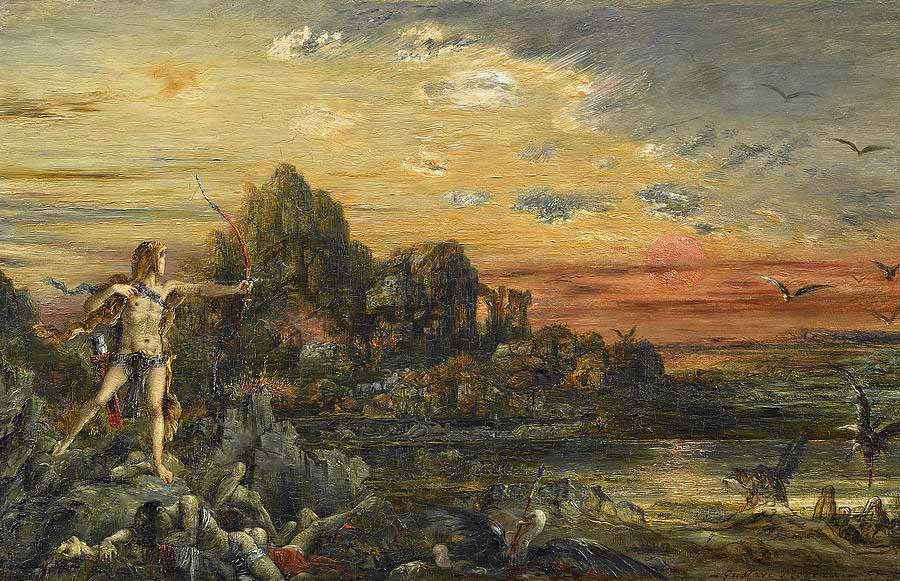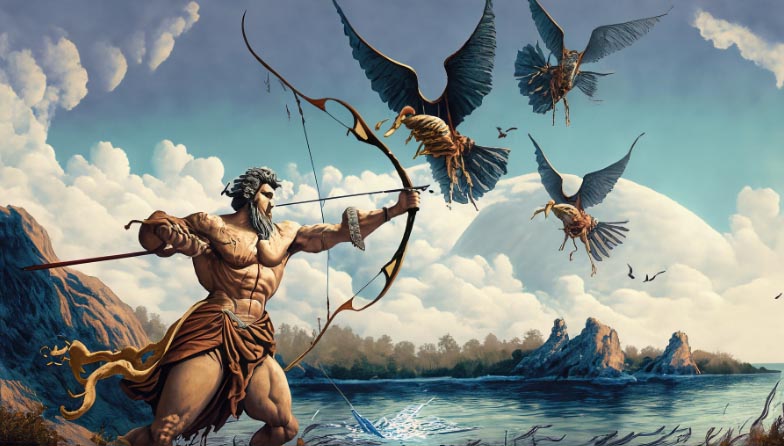Hercules and the Stymphalian Birds
The Battle with the Monstrous Birds and the Use of the Divine Sonic Weapon by Hercules
Nestled amidst the rugged terrain of Arcadia's northeastern borders lay a body of water known as the Stymphalian Lake. Shrouded in an aura of mystery and danger, the lake's tranquil surface belied the lurking menace that dwelled within its depths. Hidden amidst the dense foliage that fringed its shores, a colony of grotesque and formidable creatures made their home.These avian monstrosities, known as the Stymphalian Birds, bore a striking resemblance to chickens, albeit with a sinister twist. Their feathers, sharp and metallic, shimmered with an ominous glint under the sun's rays. Their beaks, forged from iron, were as formidable as any sword, capable of inflicting grievous wounds. With long, razor-sharp talons, they could rend flesh with ease, their hunger for sustenance fueled by an insatiable craving for human meat.The mere presence of these monstrous birds cast a pall of fear over the surrounding region. The inhabitants of Arcadia, well aware of the predators' predatory nature, dared not venture near the lake's edge. The Stymphalian Birds had become a symbol of terror, their menacing presence a constant reminder of the dangers that lurked in the untamed wilderness.
"Have you heard of the Stymphalian Birds?" Eurystheus asked Hercules one day.

"And who hasn't heard of these man-eating birds?" Hercules replied.
"This shall be your next labor, Hercules. You shall journey to the Stymphalian Lake and exterminate the Stymphalian Birds."
The following day, Hercules set out without delay to embark on his fifth labor. He understood that this would be the most perilous mission he had undertaken thus far.
Hercules arrived at the Stymphalian Lake, his eyes scanning the skies for any sign of the monstrous birds. The air was thick with the sounds of birdsong, but the creatures he sought were nowhere to be seen. Puzzled, the hero stood on the shore, his brow furrowed in concentration. Suddenly, a figure emerged from the dense foliage, her beauty as captivating as the sunlight that dappled the forest floor.
The woman smiled and stepped closer to him. Hercules was taken aback. How had she found herself near the lake? None of the locals dared to approach, as they would be threatened by the man-eating birds. Perhaps she was a foreigner and was unaware of the danger she was facing. "Who are you?" Hercules asked her.
"I am the goddess Athena," the woman said to him, Hercules. "Is there anything troubling you?"

"Yes," Hercules replied, "I came to slay the Stymphalian Birds, but I do not see them."
"They are hidden among the dense branches of the trees," Athena explained to him, "they do not come out because they fear you. But do not worry. I will help you get them out. Take these rattles. They were made by the god Hephaestus. They make a sound like the cries of the Stymphalian Birds. When they hear it, they will be deceived and come out."
Clutching the rattles tightly in his hands, Hercules watched as Athena vanished into thin air. A surge of determination coursed through him as he realized that he was now on his own, facing the formidable Stymphalian Birds.As the sound of the rattles reached the depths of the forest, a sudden commotion erupted. The Stymphalian Birds, startled from their nests, burst into the sky, their wings beating with a deafening roar. Now came the second part of his task: shooting down the birds with his bow and arrow. He had been trained by the best archers in the world, and he was confident in his skills.
The man-eating Stymphalian Birds began to fall dead, one after the other. Very few birds managed to escape and flew away seeking refuge on the island of Ares, which was located in the Black Sea. There they were later encountered by Jason and his companions during the Argonauts Expedition.
Hercules gathered the dead birds, loaded them onto his back, and took them to Tiryns to show Eurystheus and convince him that he had succeeded in completing his fifth labor.